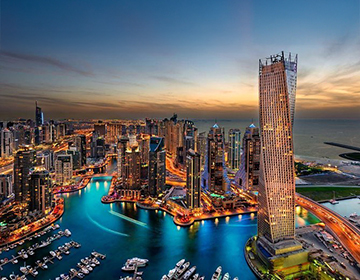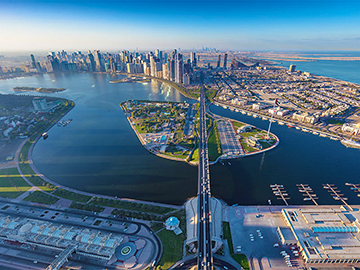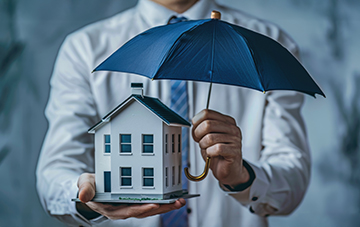- Home
- Blog
- Legislation
- Real Estate Insurance in the UAE: All You Need to Know
Real Estate Insurance in the UAE: All You Need to Know
 The UAE's dynamic real estate market, especially in cities like Dubai and Abu Dhabi, offers lucrative opportunities for homeowners, landlords, and investors. However, with these opportunities come risks such as fire, theft, natural disasters, and liability claims. Real estate insurance in the UAE is essential for safeguarding your property and financial well-being.
The UAE's dynamic real estate market, especially in cities like Dubai and Abu Dhabi, offers lucrative opportunities for homeowners, landlords, and investors. However, with these opportunities come risks such as fire, theft, natural disasters, and liability claims. Real estate insurance in the UAE is essential for safeguarding your property and financial well-being.
Choosing the right coverage can seem overwhelming, especially with the wide range of policies available. Our UAE real estate insurance guide helps you understand the different types of insurance, what they cover, and how to select a policy that meets your needs, whether you are a first-time buyer or an experienced investor.
Why Real Estate Insurance Is Important in the UAE
Owning property in the United Arab Emirates is a significant investment. Whether it's a villa in Dubai Hills or an apartment in Abu Dhabi, protecting your asset is crucial. Home insurance in the UAE provides financial coverage against unforeseen events, ensuring that homeowners and landlords are not left vulnerable to substantial losses.
Legal and Regulatory Framework
The Central Bank of the UAE (CBUAE) regulates the insurance sector, ensuring that insurance companies operate within a structured framework. While property insurance is not legally mandatory across the UAE, many mortgage lenders require borrowers to have adequate coverage before approving loans. This requirement underscores the importance of insurance for property owners in the UAE.
Types of Property & Liability Insurance
 Understanding the various types of real estate insurance in the UAE can help you choose the right coverage:
Understanding the various types of real estate insurance in the UAE can help you choose the right coverage:
1. Building Insurance: Building insurance in UAE covers the structural aspects of your property, including walls, roofs, and permanent fixtures. Protecting against damage from fires, floods, or earthquakes is essential.
2. Contents Insurance: Also known as home contents insurance, this policy protects personal belongings such as furniture, electronics, and appliances against theft, fire, or other damages.
3. Landlord Insurance: Designed for property owners who rent out their properties, this insurance covers building damages, loss of rental income, and potential liability claims from tenants.
4. Liability Insurance: Liability insurance for homeowners in the UAE protects against legal claims if someone is injured on your property. This includes coverage for medical expenses and legal fees.
5. Property All Risk Insurance: A comprehensive policy that covers a wide range of risks, including accidental damages, theft, and natural disasters. It's suitable for both residential and commercial properties.
How to Choose the Right Insurance Policy
Selecting the appropriate property insurance in the UAE involves considering several factors:
 Assess Your Needs: Determine whether you need building insurance, contents insurance, or both.
Assess Your Needs: Determine whether you need building insurance, contents insurance, or both.
Compare Policies: Explore multiple insurance providers to review different plans and choose the one that best fits your needs.
Check Coverage Limits: Ensure that the policy covers the full value of your property and possessions.
Understand Exclusions: Be aware of what is not covered under the policy to avoid surprises during claims.
Common Claims and Coverage Details
Understanding what property insurance covers in the UAE can help you make informed decisions:
Natural Disasters: Coverage for damages caused by events like floods, earthquakes, and storms.
Fire and Theft: Protection against losses due to fire outbreaks or burglary.
Accidental Damage: Coverage for unintentional damage to the property or its contents.
Liability Claims: Protection against legal claims arising from injuries sustained on your property.
Insurance Requirements Across UAE Cities
 While the basic principles of property insurance apply throughout the UAE, there are some city-specific considerations:
While the basic principles of property insurance apply throughout the UAE, there are some city-specific considerations:
Dubai
In Dubai, property insurance is often a prerequisite for obtaining a mortgage. The city's high-rise buildings and luxury villas necessitate comprehensive coverage, especially in areas prone to specific risks.
Abu Dhabi
The insurance requirements for real estate in Abu Dhabi highlight the importance of securing property coverage. While insurance is not legally mandatory, many financial institutions require proof of coverage before approving property loans.
Ras Al Khaimah
In Ras Al Khaimah, the growing popularity of beachfront properties and resort-style living increases the need for specialized insurance policies that cover natural elements like flooding and coastal storms.
Sharjah
Sharjah focuses heavily on community living and family-oriented developments. Property insurance is recommended to protect against risks such as fire and theft, particularly in mixed-use and residential complexes.
Umm Al Quwain
In Umm Al Quwain, where development projects are expanding, house insurance in UAE, Umm Al Quwain, is becoming more common among property owners to safeguard new builds and rental properties against structural damage and unforeseen incidents.
How to Get Property Insurance in the UAE
 Securing property insurance in the United Arab Emirates involves a straightforward process. Here is a quick look at how to get property insurance in the UAE:
Securing property insurance in the United Arab Emirates involves a straightforward process. Here is a quick look at how to get property insurance in the UAE:
1. Research Providers: Identify reputable insurance companies or brokers operating in the UAE.
2. Request Quotes: Obtain quotes from multiple providers to compare coverage options and premiums.
3. Submit Documentation: Provide necessary documents, including property details and identification.
4. Review Policy Terms: Carefully read the policy terms and conditions to understand coverage and exclusions.
5. Finalize and Pay: Once satisfied, finalize the policy and make the required payment to activate coverage.
How to File a Property Insurance Claim in the UAE
In the event of a loss or damage, follow these steps to file a property insurance claim in the UAE:
.jpg) 1. Notify the Insurer: Contact your insurance provider immediately to report the incident.
1. Notify the Insurer: Contact your insurance provider immediately to report the incident.
2. Document the Damage: Take photographs and gather evidence of the damage or loss.
3. Submit a Claim Form: Complete the insurer's claim form, providing all necessary details and documentation.
4. Cooperate with Assessors: Allow the insurer's assessors to inspect the damage and evaluate the claim.
5. Receive Compensation: Once the claim is approved, the insurer will provide the agreed-upon compensation.
Protect Your Property and Investment
Real estate insurance in the UAE is a vital component of property ownership and investment. By understanding the types of insurance available, the legal framework, and the process of obtaining and claiming insurance, property owners can protect their assets and ensure peace of mind. Whether you're a homeowner, landlord, or investor, securing the right property insurance in the UAE is a prudent and necessary step.








